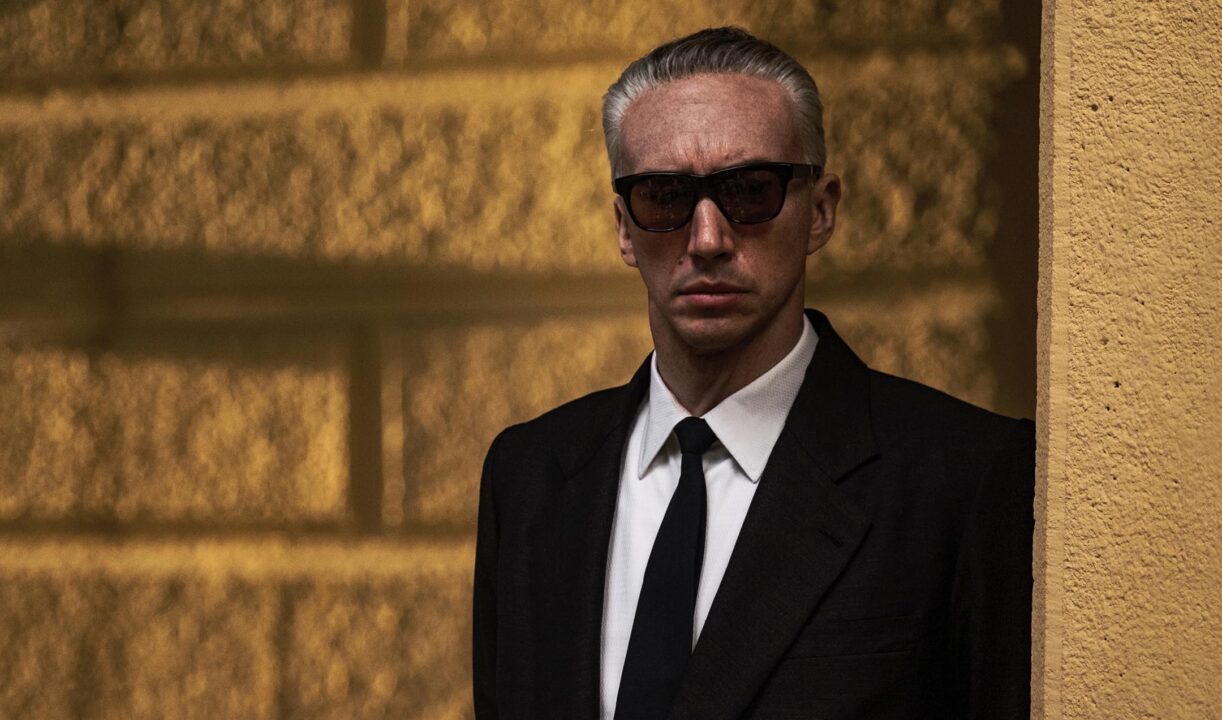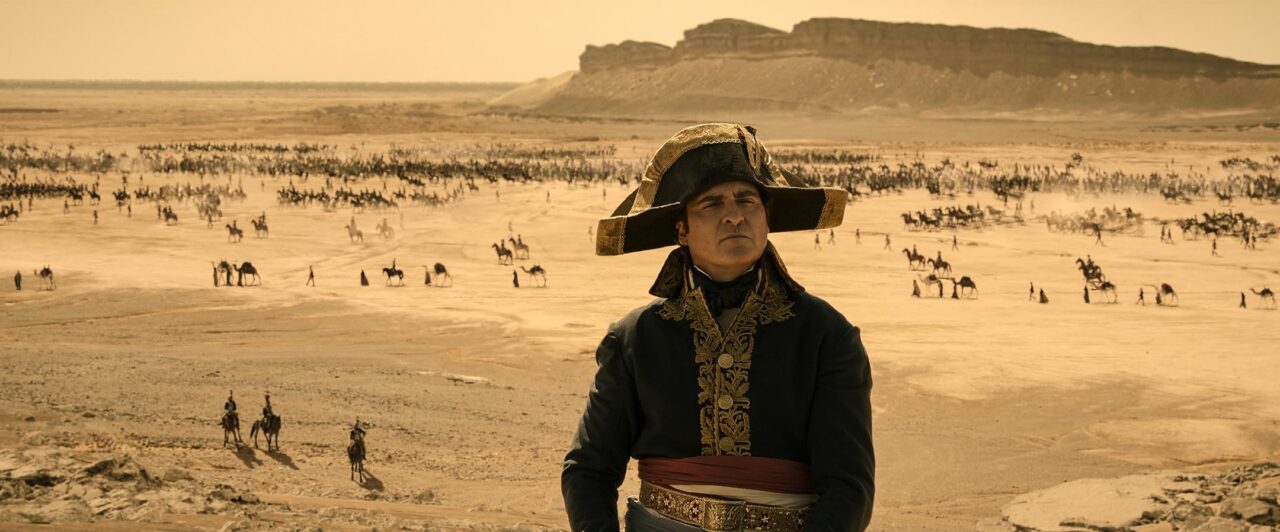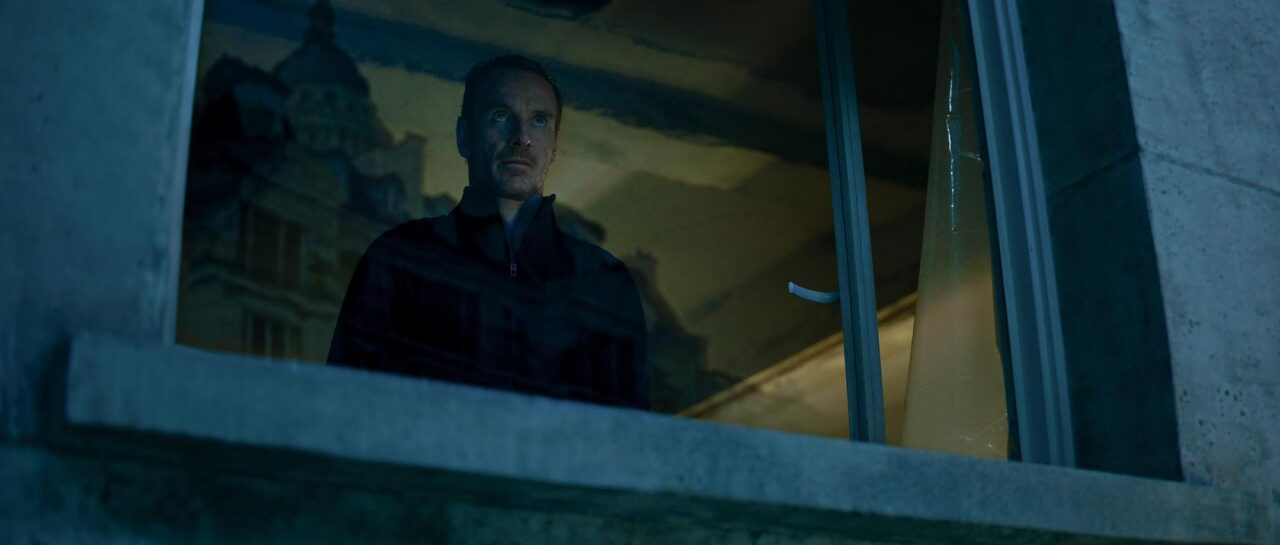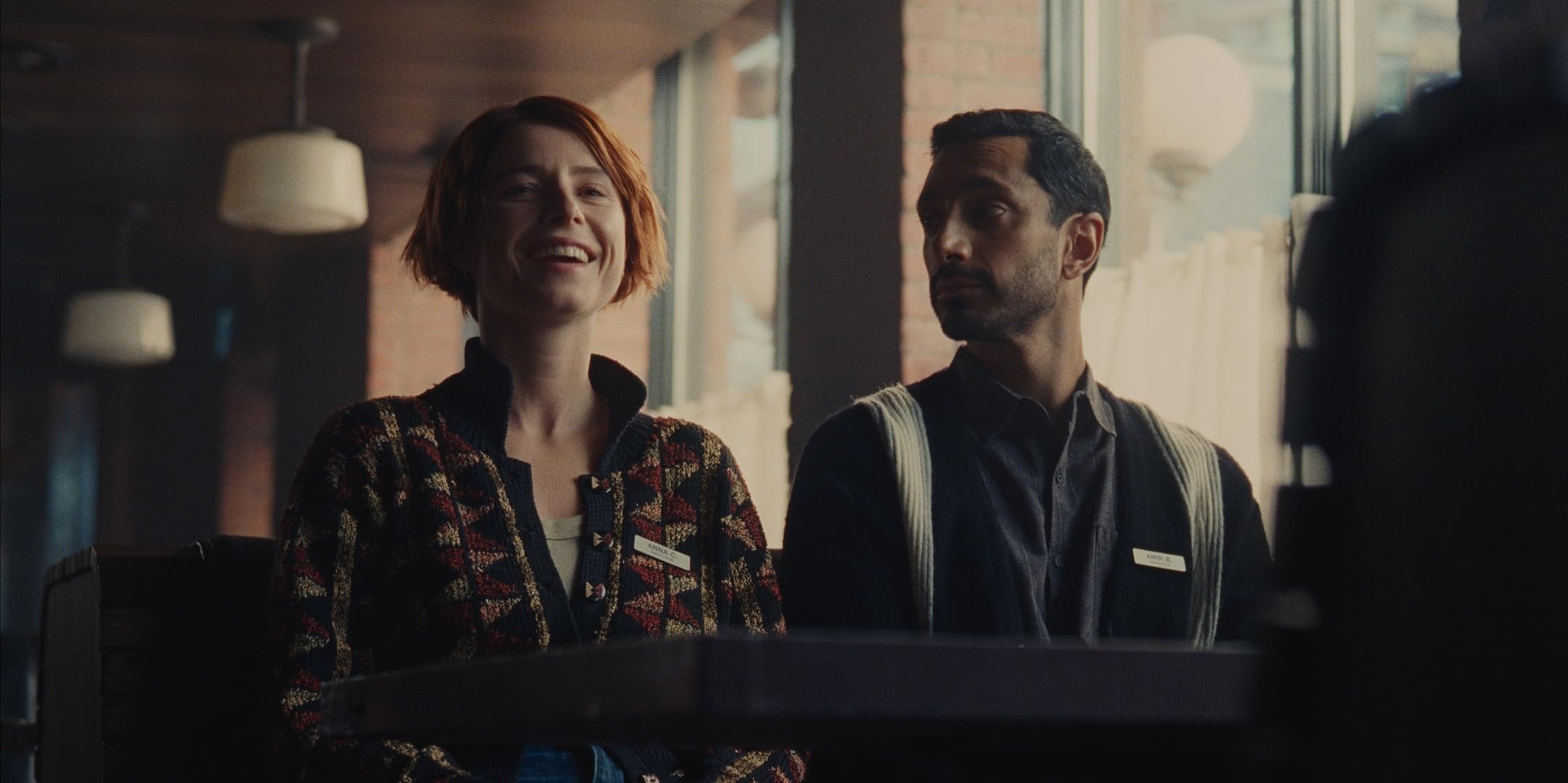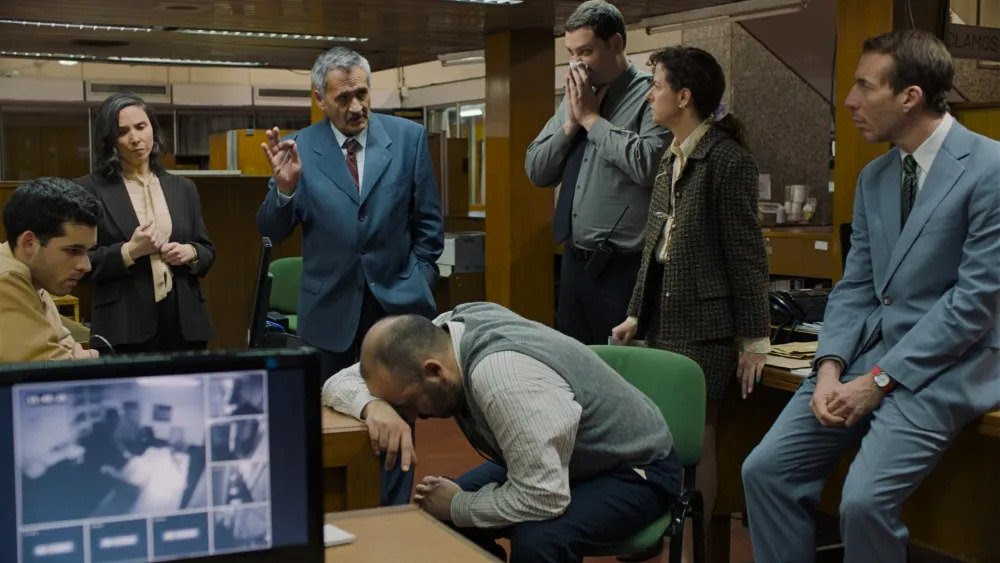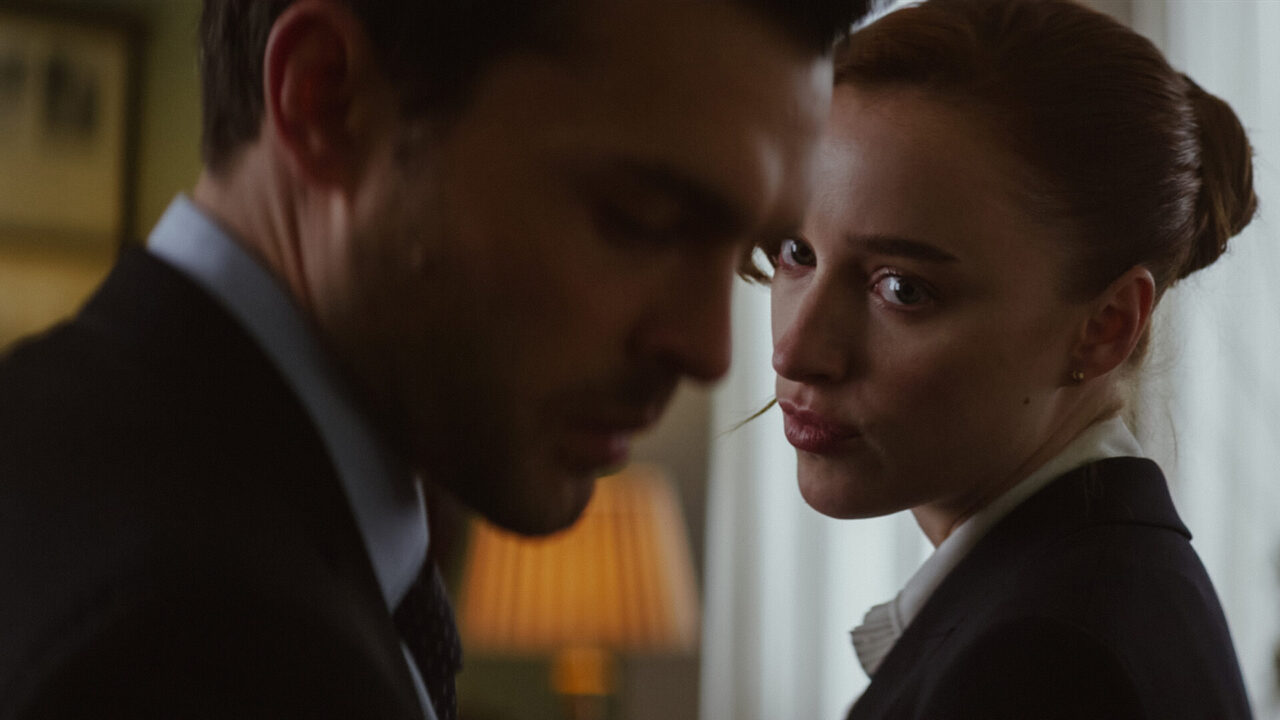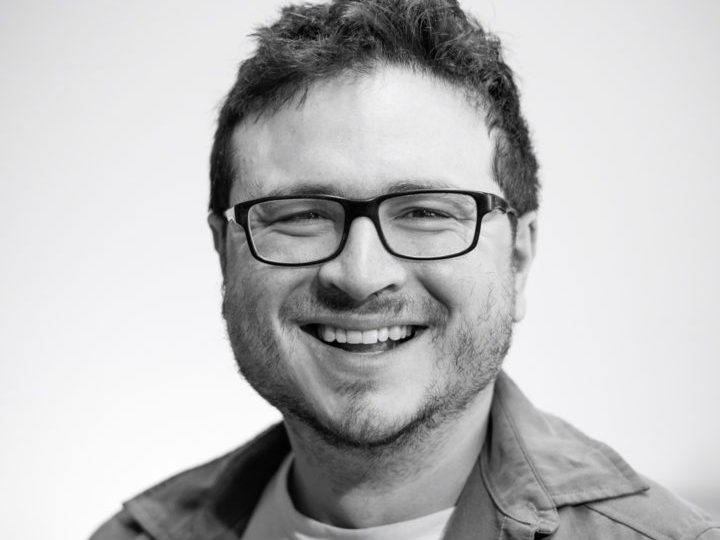‘Ferrari’ Is Entertaining, Exhilarating, But Speeds at Surface Level
"Two objects cannot occupy the same point in space, at the same moment in time," says famed Italian automaker Enzo Ferrari in Michael Mann’s new biographical drama, Ferrari. While Ferrari’s words are spoken about car racing, they are also true about the larger forces that compete to edge out the other in his life; success and failure, happiness and heartbreak, and even life and death are consummate rivals that race to occupy the same spot in Ferrari’s world.
Set in the summer of 1957, Ferrari focuses its story on Enzo Ferrari (Adam Driver) at a pivotal crossroads in his life. We see early on that Ferrari–a former racecar driver himself–lives a life that’s colored by the loss of his young son, whom he grieves with the child’s mother, Laura (Penélope Cruz). It’s a loss that's ripped them apart, their relationship now comically and tragically disastrous, symbolized by their constant shouting matches that sometimes lead Laura to produce a handgun to illustrate the intensity of their fights.
Although their marriage is a sham, Enzo and Laura still need each other, as they both own majority stakes in the Ferrari company. It’s a predicament for Enzo, who would rather deal with matters on his own. To that end, we see just how private a man he is, choosing to wrestle with his demons in secrecy. The largest example is his secret relationship with Lina (Shailene Woodley), the “other woman” whom he shares a son with. Meanwhile, Enzo must hide that the Ferrari company is near bankruptcy. It leads him to bet the company and push his drivers to win the Mille Miglia, a 1,000-mile race across Italy which ends up having disastrous results.
Following the likes of the singularly titled Oppenheimer, Napoleon, and Maestro, Ferrari is the latest film of 2023 to tell the story of great, troubled men who were integral to history but lived complicated lives (often at the expense of their female partners). Here, director Michael Mann follows up such classics as 1995’s Heat and 1992’s The Last of the Mohicans–along with more recent films such as 2009’s Public Enemies and 2015’s Blackhat–with another successful film that I enjoyed seeing in theaters. The racing scenes are gripping, and the throttling engine roars make the hairs on the back of my neck stand up.
https://www.youtube.com/watch?v=8oOVNMjM1Jk&ab_channel=NEON
What’s more fascinating is that Michael Mann, at 80 years old, seems to be less interested in making an all-out action film, and instead more interested in turning the camera inward to investigate the interior life of a man who, after dedicating his life to his career and passion, realizes he can no longer outrun his grief and guilt nor the failings in his life that now consume him.
Based on the book Enzo Ferrari: The Man, The Cars, The Races, The Machine by Brock Yates, Troy Kennedy Martin’s script focuses on a fascinating time in Ferrari’s life when everything seemed to hit at once. The frankness of addressing infidelity and mortality is weighty, and we get a very vulnerable moment in time from this figure. However, the script and story feel a bit too slick and straightforward. Without much subtext, the dialogue and exposition are oftentimes left to fall flat enough that it feels like we’re sometimes amongst the pit crew, looking right under the popped-up hood to see all of the story's pistons and parts firing. Yet, it’s all so beautifully visualized that the film–set in 1950s Italy–is a dream to live in throughout its 2h 10m runtime. The film is also lushly photographed by Academy Award-winning Director of Photography Eric Messerschmidt (all the more impressive when you learn that he also photographed David Fincher’s The Killer which was released in the same year).
For all of its technical achievements, the film’s success comes down to its lead performances. Adam Driver brings depth to the lead character that conveys much more than the script even offers. And Penélope Cruz is beyond fantastic, stealing every scene she's in. Shailene Woodley feels like the out-of-place one here, but her character brings a softness that counters Laura’s fire. For being a story of highly famous Italian people, the film has an uphill battle to climb with how believable its actors' authentic Italian ethnicities can be. And although they never fully disappear into them, they bring an emotional authenticity that does a commanding job.
With its amazing visuals and incredible period piece production, along with exhilarating racing sequences, Michael Mann’s stirring character study of a tortured entrepreneur trying to outrace his demons is solidly built, even if fails to get past the surface emotionally.
2h 10m. Rated R for some violent content/graphic images, sexual content, and language.
Honey Head Films Bring Women's Stories To The Screen
Imagine you're someone whose passion lies in an industry that's beyond difficult to "make it" in. Moreover, imagine that it historically doesn't support the type of thing you want to create. And, imagine that its epicenter lies primarily across the country from where you live. Would you let that stop you from following your dream? Or would you confidently pursue your ambitions, no matter how challenging? If you're a filmmaker like Erika Arlee and Kristi Ray, the latter is exactly what you do.
North Carolina natives and filmmaking partners of Honey Head Films, Erika and Kristi, are shining examples of indie filmmakers who not only create but support female-focused films. In our exclusive, wide-ranging conversation, Erika and Kristi discuss their path in filmmaking, producing their latest film A Song for Imogene (which Erika wrote and directed, and Kristi Ray produced and starred in), creating their female-led production company, their lessons learned, and what all lies ahead for the filmmaking duo.
It's such a pleasure to meet you both, Erika and Kristi. What was the last great film you watched?
Erika: This is going to be a huge throwback, but I just watched Gone Girl for the first time recently and loved it. I started my career as a writer of fiction, so I am always excited by films that are based on books. There is something different - perhaps more intricate - about the weave of the storytelling. I’ve been a Gillian Flynn fan since I read Sharp Objects (which is now a miniseries starring Amy Adams), so it was no surprise that I enjoyed Gone Girl. I appreciate a film that keeps you guessing and a writer who is always one step ahead of her audience. That’s smart work. Flynn’s duality in both traditional literary fiction and screenwriting is something I have always aspired to.
Kristi: Such a fun icebreaker. We started our festival run this summer with a World Premiere at Bentonville Film Fest. I haven’t gotten Fresh Kills out of my mind since. This was Jennifer Esposito’s directorial debut - a powerhouse female-centric story about the life and unspoken realities of the wife and two daughters of a Staten Island mob boss. The casting was phenomenal and the whole film and how it was made was incredibly inspiring. We were lucky to catch it the day after its Tribeca premiere and Jennifer, who also stars in the film, led a memorable Q&A. I loved the similarities between this film and A Song for Imogene - both diving into the burden of expectations that mothers, daughters, and sisters bear and how women struggle to be everything to everyone all the time.
You're both native North Carolinians. What was life like growing up there for each of you?
Kristi: I love this question because it helps to unpack the layers of catharsis that went into making this feature. I spent my formative years down a dirt road off Hwy 17 East, in one of those drive-by Southern towns where people never really seem to leave. Getting out wasn’t easy or intuitive. At a very young age, I knew I would grow up to be an actress and started on stage at the community theater in maybe first or second grade. Being raised in a small town kept me grounded and I’m thankful for that. My grandparents had a huge garden on their property and we spent summers shucking corn, picking strawberries, and running through the sprinklers. We had a modest little house that backed up to a trailer park where my siblings and I shared a bedroom.
My blue-collar parents got married right out of high school and worked hard to try to give us opportunities that they didn’t have. I wasn’t raised to be an entrepreneur and had to figure out a lot of things on my own. As far back as I can remember I was always daydreaming of building a career in film in some other place other than where I was raised. Part of what makes Imogene so special is that it pays homage to my upbringing in a very personal way. I never watched characters I could relate to on-screen as a young girl and I think our film does a very good job of remaining authentic to Eastern North Carolina and the working poor in these off-the-map places.
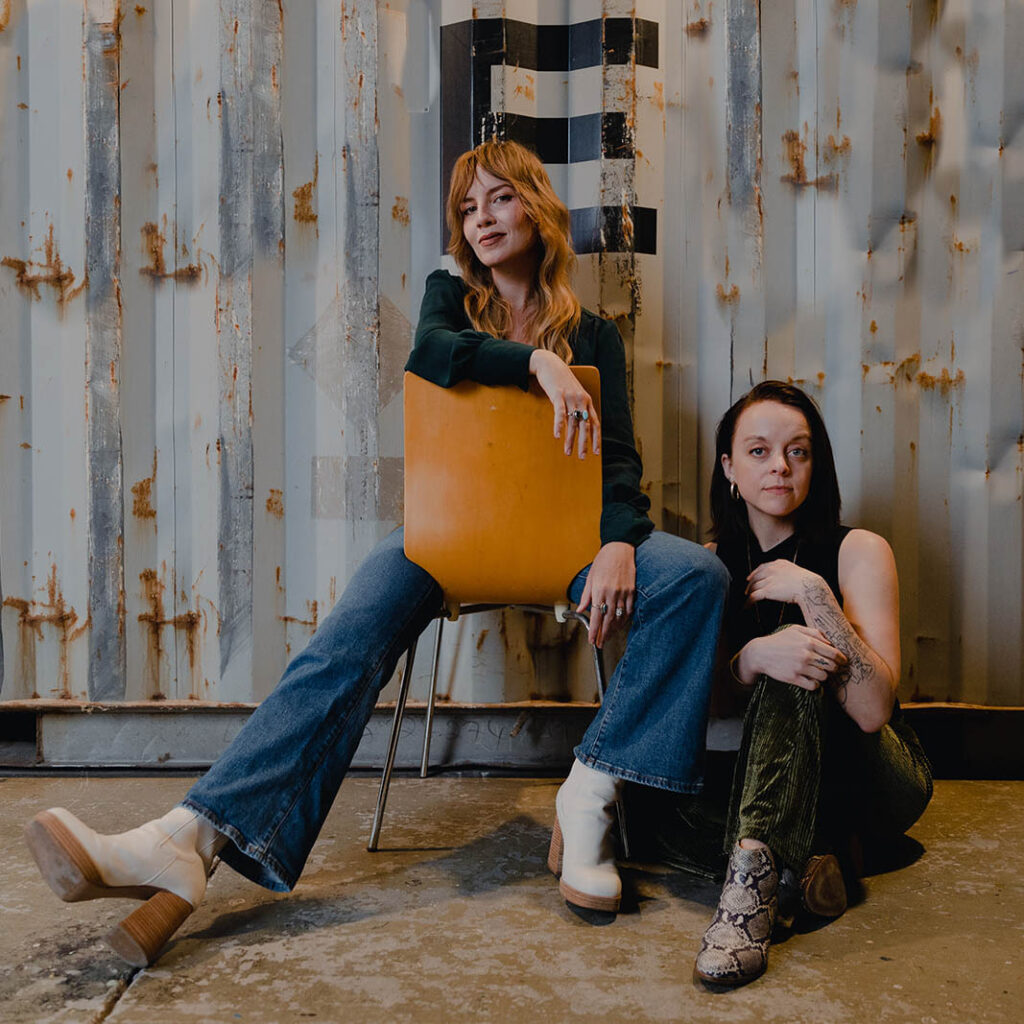
Erika: I have always been a storyteller. Growing up, I was a voracious reader and journaled constantly. Sometimes the journal entries would become short stories, which eventually became plays that my sisters and I would put on at dinner parties, much to our parents' chagrin. We weren’t allowed to watch television, but both my mother and father were constantly filming home movies on our enormous VHS camcorder. We could watch the tapes whenever we wanted, and I remember being fascinated by the fact that I could see myself on screen, like an actor in a play or movie. It wasn’t long before I wanted to pick up the camcorder and observe the world through that medium.
I guess that’s what my childhood was: an experiment in observation. I have always been a highly observational and intuitive human since I was young. The first time I became fascinated by rural eastern North Carolina was through observation; every time I went home to visit my grammy and papa at my mother’s childhood home. I didn’t know it at the time, but that was the genesis of Imogene: the desire to explore the people in these forgotten places. To give their stories a chance to be told.
Erika, what were some of your earliest and most formative memories of watching movies? Which films and filmmakers were you drawn to growing up that shaped your cinematic worldview?
Erika: When we were allowed to watch movies, it was always the classics: Star Wars, Indiana Jones, Back to the Future, and The Sting. And of course, anything Disney. Epic tales. Class Spielberg and Lucas. The adventures and heroes' journeys. I loved being brought into a filmmaker’s world and bonding with my family over films. And once DVDs came out and they had a “special features” tab… that was it for me. I would just turn on a film to watch the “making of” or “behind the scenes” or “director’s commentary.” And this was as early as middle school.
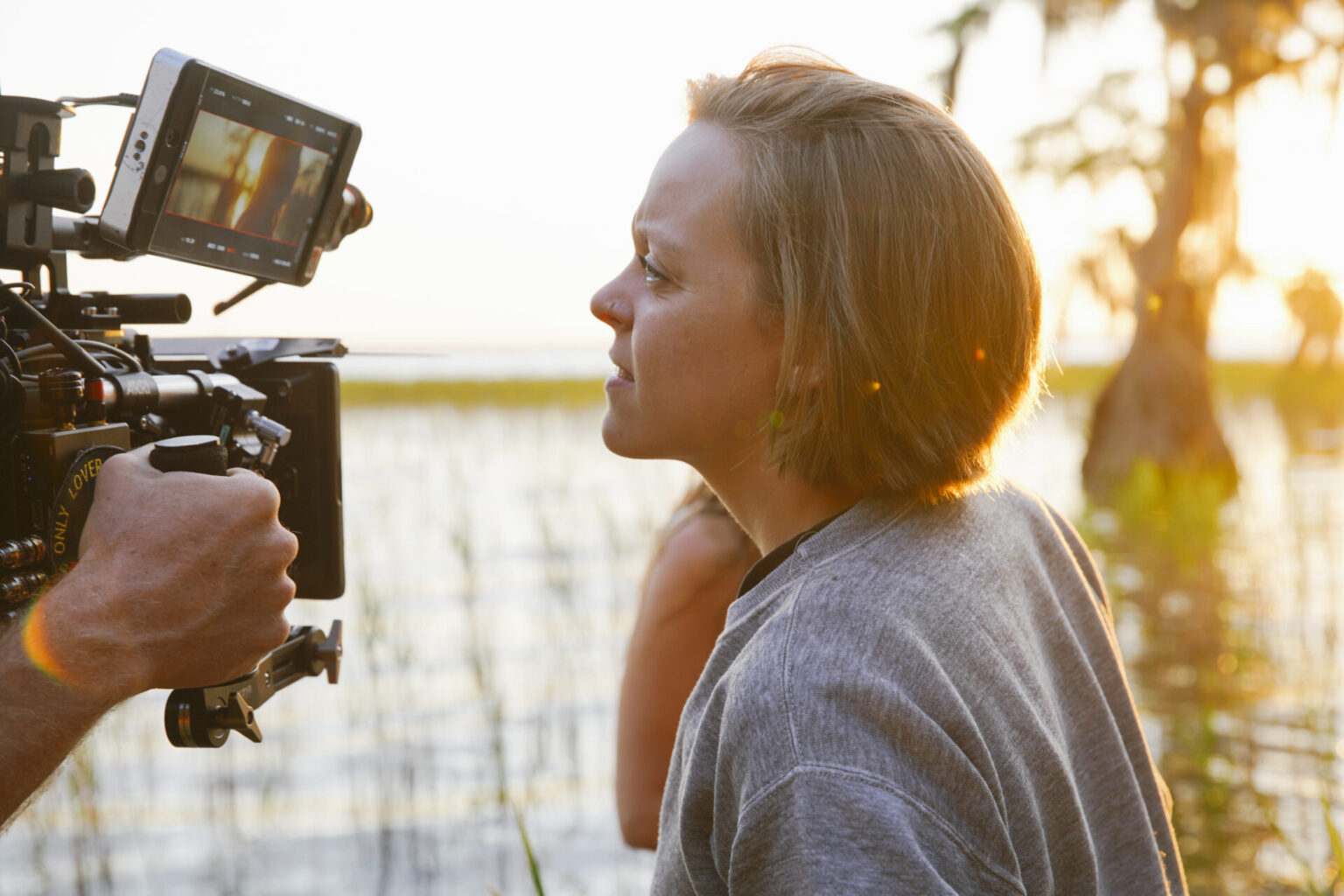
I was fascinated by the practical effects and how a director chose to tell a story: what to reveal to the audience and what to keep a secret. The fact that those films are still extremely popular today resonated with me. I understood that there must be some universal truth to them: something that can transcend generations and advancements in VFX. Even though Imogene is a gritty study of realism, I think the principles of storytelling that I gleaned from those classics growing up will always ring true, no matter the genre.
When did you both get into filmmaking? And how did you both first meet?
Kristi: I left home at 17 and moved straight away to Los Angeles - thinking that was simply what you had to do to break into the industry. I’m so thankful I was wrong. I was in a serious state of culture shock for some time and as my meager savings were dwindling, with no film credits to my name, I was hitting a wall getting my foot in the door. About a year later I fortunately found myself cast in the lead role in an indie feature shooting back home in North Carolina. At that point, I decided to put a few fake films on my resume so I could at least land an audition. Not my proudest moment, but it worked.
I remember being so humbled/nervous/excited stepping onto that film set for the first time - and realizing I didn’t even know what a mark was. I was hyper-aware of all that I had to learn and took that 21-day shoot as an opportunity to soak in not only what was expected of me as an actress but also to observe and respect the technical roles of crew members in every department. I fell in love with indie filmmaking on this fairly intimate set and realized then that I could make a career in the Southeast, a place where my soul felt its best.
I traveled for the next 5 or 6 years working on indies and training at Lee Strasberg in NYC. At that time I was still supporting myself with random odd jobs - the kind you could quit without notice when you booked a movie. I ended up in Wilmington in late 2014 and met Erika through a Craigslist casting call for her earliest short film. She was the second female writer-director I had the opportunity to audition for and her screenplay was incredibly nuanced. At that point, I was exhausted by the one-dimensional characters I was going out for and wanted to be in her film. I had no idea that she was so green (or young!). We met on set the night before Day 1 and have been making female-centric narratives together ever since.
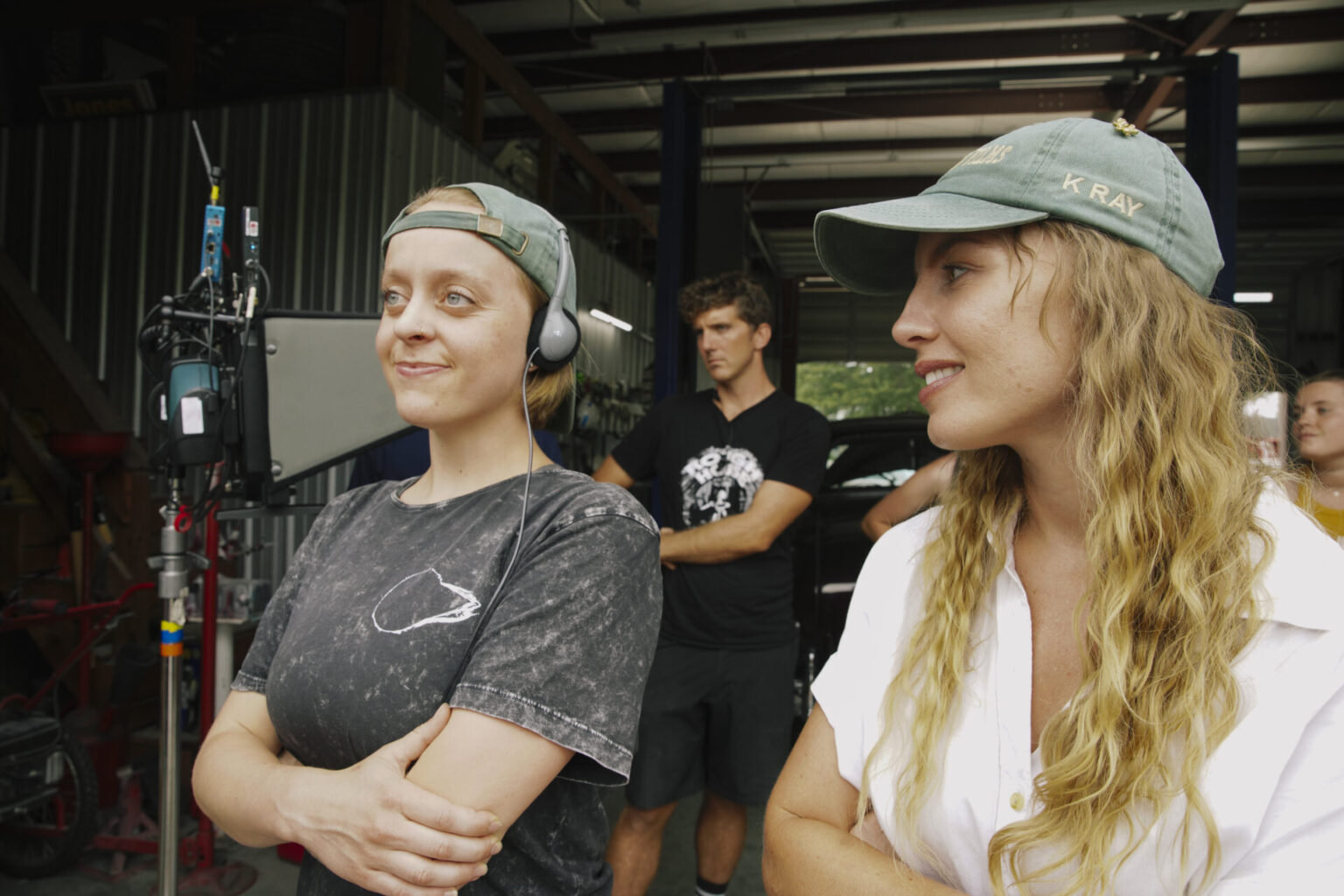
Erika: I have always been a filmmaker at heart, but I didn’t realize it could be a career until I found my way into it. As a young twenty-something, I was primarily focused on acting, either for the stage or screen. I came out of college wanting to start my own theatrical production company, but I didn’t want to live in New York or Chicago. So I moved down to Wilmington to get a bit of a fresh start, and I got involved in local theater and film here. I was doing stand-in work, taking acting classes, and eventually landed an agent. I booked my very first audition, which was a day-player role for a major network show that was filming here at the time. That put my worldview into perspective.
Going on the lot at Screen Gems to get fitted, then showing up on location, seeing hundreds of crew running around, being shepherded to the HMU trailer, then to holding, then to set, where there was a huge dinner scene happening with about twelve cast members all in period costume… it was a lot. I had never seen anything like it. But what left the biggest impression on me was how stressed out everyone was: even angry at times. We were all doing something we had probably dreamed of since childhood, yet no one seemed happy to be there. Log that away for later after I meet Kristi and realize we’ve both had similar experiences with a broken system.
On weekends when I wasn’t working odd jobs to stay afloat, I was making short films with a group of friends. After a while, I decided to try writing and directing my own short. It was a two-day shoot, all set in one location, where I could cook and host the cast/crew, as well as the production. Two of the five roles were already filled, and we had three more to cast. I put a casting call on Craigslist, and Kristi submitted for it. She was excellent, of course, so I cast her, and that’s kind of how it all got started.
You both founded your production company, Honey Head Films, in 2016, with a mission to tell powerful, female-centric stories. How did you both decide that's what you wanted to focus your films and stories on telling?
Erika: Bringing it back around to the note I pinned in the earlier question: after Kristi and I met, we started putting each other on tape for auditions. It was through this process that we both realized how absurd the casting process can be. Kristi would pour her heart and soul into preparing an audition, only to get passed over for some model with many followers on social media. The superficial nature of the film industry can be soul-sucking, and if you’re only investing in one path forward, it gets discouraging pretty fast. Especially as a young woman reading one line for “Hot Girl” at the party. Or driving to Atlanta and back in a day for a callback for “Waitress.” It didn’t take long before we decided to “stick it to the man” and start making our movies. Gatekeeping be damned.
And a huge part of that was giving women more depth: we were done with seeing women put into such limited, trope-y boxes: "the nagging wife," "the sex object," "the 26-year-old model playing a 17-year-old." And we wonder why young girls have body image issues and feel like they have to be people pleasers. Things needed to change. And it wasn’t going to change just by putting female characters in an executive suite or a superhero suit. By making them men. It was going to change by embracing all the ways women are dynamic and unique without men: putting those qualities on screen and creating compelling cinema around stories that explore the female experience.

Kristi: I touched on this a bit in the last question, but to unpack it: the evolution of Honey Head has been incredibly organic. There was the intention behind the kinds of scripts we wanted to bring to life and the roles for females in them, but we founded the company as strong women who felt there was a better way to produce films. At a time when inclusivity, equality, and counter-culture environments were not necessarily valued in our industry, Honey Head stood for something fresh and different.
Naturally, the characters were layered, multi-dimensional, and relatable - Erika can’t help but author empowering stories like that. With acting being my first love and Honey Head the catalyst to continue on that journey with more autonomy, Erika is constantly developing challenging characters for me to explore. What started as a group of women being their most authentic selves quickly attracted collaborators and clients who aligned with the brand we were building. In a way, everything unfolded fairly effortlessly - with a lot of hustle.
Erika, A Song for Imogene–which you wrote and directed–is your feature film debut. What was the process like for you seeing your vision come to life on the big screen?
Erika: Wow. This is a great question. Imogene started as a short film called Lorelei, which I wrote in 2015 for Kristi and myself to play sisters (at the time, I had cast myself as the character who is now "Janelle," and Kristi as the character who is now "Cheyenne"). It was the second short film I ever wrote, and it poured out of me: seven pages in one night and the script never changed after that.
Developing the story into a feature was a different task. I had to figure out where the short narrative fell in the timeline of a full-length treatment, then reverse engineer the characters: their needs, desires, struggles, and triumphs. The film is highly personal, from the landscape to the struggle between Cheyenne and Alex. I had about 20 pages written for about half a year in 2019, but it wasn’t until 2020 when the world came to a screeching halt, that I was able to take a full week to sit down and pump out the rest of the first draft. It was rough, but it was a starting point. Over the next two years, I fine-tuned the story. To be honest, I was tweaking up until one of our producers told me I couldn’t anymore because we had to finalize the stripboard. The first day on set, when we got the picture up and I saw Kristi as Cheyenne for the first time, that was pure magic. It was happening! All that time spent financing, prepping, revising–all the false starts, the joy, and tears–had led to this moment.
Celebrating our world premiere at Bentonville this past June was truly rewarding. And seeing the impact it has had, and the conversations it has started has made every tough moment worth it. Are there things I would change? Sure. Every project is a learning experience: a chance to hone your craft. I don’t know if I’ll ever be able to fully relax at a screening. But that just means you’re growing as an artist.
https://www.youtube.com/watch?v=Xcd7C3q5CKo&ab_channel=HoneyHeadFilms
Kristi, not only do you play the film's lead, "Cheyenne," but you are also a producer of the movie. Can you talk about how you were able to do both jobs throughout production, and what challenges you faced?
Kristi: "Fix it in prep" is a mantra I live by as a producer. I knew this story and this character inside and out - Erika wrote the role for me back in 2015 shortly after we met when it was just a seven-page short film. "Cheyenne" has of course evolved throughout development, but I think what I love most about that process was how much of myself I was able to bring to the character with the final draft of the script. Playing the role came naturally to me; so aside from guitar lessons and learning to ride a motorcycle, most of my prep work came from the producing side.
Erika and I had been developing this project for years and pushing through some form of financing, pitching, or pre-production for over two years by the time we stepped on set last June. It truly is our baby and I’m proud to have played a pivotal role in every stage of the process from script revisions to location scouting, building our crew, the website, the pitch materials to financing and securing an EP, all the way down to sourcing our wardrobe stock, making casting decisions and fine-tuning the budget and equipment lists.
I had a goal to step away from logistics two weeks before principal photography. That didn’t happen, because: of indie film, but thanks to my amazing producing partners Michelle Roca and Andrea Nordgren, I was able to retreat into deep character prep about a week before cameras rolled. Since we had done such a thorough job in pre-production, things went very smoothly during our 21-day shooting schedule. I put out fires after wrap each day which sometimes was mentally exhausting because there were dozens of weighty scenes that required deep emotional vulnerability throughout the shooting schedule.
One thing I will say is that each crew member was hand-picked and departments were curated based on skillset, chemistry, and trust. I can’t stress enough how important it is to surround yourself with a passionate crew who you can be transparent and authentic with during your first time out on a feature. We hired on potential over-proof and assembled an amazing team and support system where each crew member felt deep ownership over the film. At the end of each day, people felt cherished and appreciated. That boost of morale goes a long way to mitigate inevitable stress on set.
Erika, you've said that the character of "Cheyenne"–who struggles with being in an abusive relationship–is a character that is highly personal to both you and Kristi. You've also said that making the film was a cathartic process to heal from your own experiences dealing with coercive control. What was it like as an artist to need to be so vulnerable and honest in telling this story to share with audiences?
Erika: As writers, I think it’s our job to be vulnerable. To write from a place of what we know, and allow others to step into shoes that feel familiar, in one way or another. Domestic violence can take many forms. It’s not always physical. It can be financial control, emotional abuse, guilt-tripping, or gaslighting. Things that leave emotional scars that are easily hidden from the world. That was my experience. With my first partner, I truly loved, and then subsequent people after that. It’s hard to break the cycle once your perception of what love is has been so twisted. But I did finally break the cycle and learn to love myself again.
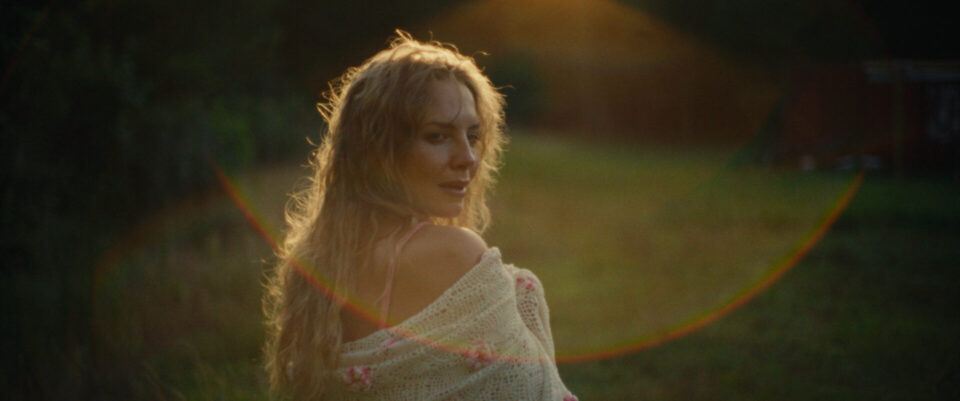
My hope for this story is it helps people who might be in danger of a partner escalating to see the warning signs. And for bystanders to recognize when someone close to them could be suffering in silence. It might be easy to say: why doesn’t she just leave? Well, it takes a victim an average of seven attempts to leave an abusive partner. The story is subtle. It’s realism. You can’t authentically connect with an audience and start important conversations unless you’re willing to be vulnerable. The number of people who have come up to us after a screening and shared tears or relayed a shift in perspective tells me this film is doing what it set out to do: one small step at a time.
Kristi: It was a tremendously rewarding experience, and continues to be as we’ve started to share with audiences. The script hits so close to home that even some bits of the dialogue are direct quotes that either Erika or myself have pulled from past relationships. I’ve personally broken each of the emotional chains that Cheyenne faces in this story in my real life and bringing that character work to set each day could have been a triggering experience. Fortunately, there was a deep trust between myself and Erika - obviously, but also with my co-stars Haydn Winston and McKenzie Barwick. These two incredible actors approached each scene with so much reverence that it was, for the most part, an empowering and comfortable environment to perform in. We held closed sets when necessary and surrounded ourselves with sensitive artists who understood and respected the depth of the work.
This was the story we needed to get out into the world and witnessing so many people relate to and empathize with these life-bruised characters and the subtleties of their struggles made the work purposeful and cathartic.
The film was shot in North Carolina, where nearly the entire cast is from. Can you talk about how you found the cast, locations, what you wanted to emphasize about North Carolina, and what makes it so special to you?
Erika: Authenticity was incredibly important to the casting of this project. One of the reasons why I was hesitant to write the feature at first was because I wasn’t sure if we could find the right actor to play Alex. He needed not to come across as a one-dimensional antagonist. If he was easy to hate, then the audience would have no sympathy for Cheyenne, and we would lose them. Alex had to be complex, and manipulative not only to Cheyenne but to the viewer. That is a tricky thing to pull off, but when I saw Haydn act for the first time on the set of another project I was producing, I knew he could do it. From there, I wrote the character for Haydn, which I love doing as a writer.
When it came time to cast Janelle, that was an open call. I had written the character in my voice since I played her in the short, but we didn’t have anyone in mind for the role. We had entertained the idea of casting a name actor as a way to bolster the marketability of the film and raise our chances of distribution on the back end. We sent a slate of actresses to a couple of different distributors, and they all came back as “not needle-movers.” Short of casting Brie Larson as "Janelle," it seemed like we were better off finding someone local to play the role. That also fits the story better.
Imagine how distracting it would be to be chugging along through this slow-burn indie drama set in the rural South, then suddenly Jennifer Lawrence appears. Honestly, once McKenzie submitted her tape, we knew she was Janelle. The character was in her bones, as a comedic actress and Southerner. The rest of the cast fell into place from there, and I am so glad to have such strong performances from talent who are part of the fabric of the setting. It makes the film immersive, and it gets that reaction from audiences when they say: “I know those people.”
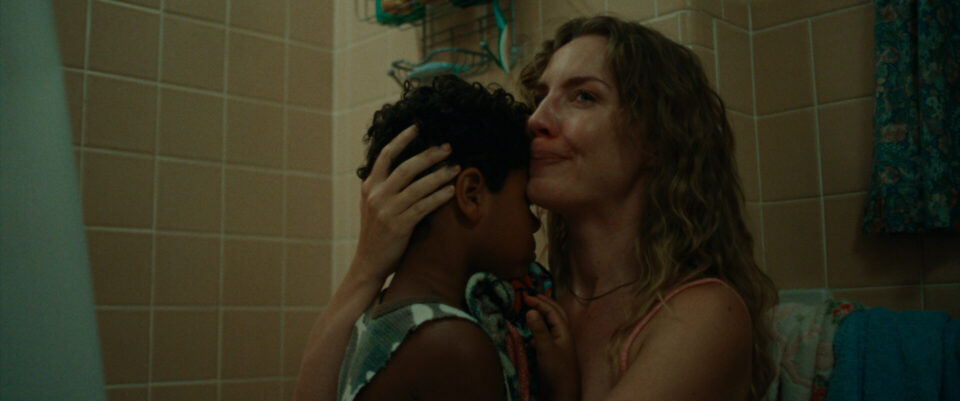
Kristi: We had a unique experience casting the nuclear family and the film’s lead characters. It’s something that came together back in 2020 when we were pitching the project. Honey Head produced a three-minute proof of concept trailer to present to potential investors that showcased tone, pacing, and production value. Creatively it also served as an audition or mood board for various locations and actors and costuming choices. When it came time to lock the cast for the feature film, we held multiple rounds of auditions for every character but Cheyenne and Alex - who Erika wrote specifically for Haydn and me.
In the end, it was a big family reunion as the mother, sister, and nephew characters were all reprised by the original cast from 2020. It was crucial to both of us that the casting was authentic and we are very proud to tap into the deep talent pool in the Southeast while mixing in the right amount of non-actors and very green actors to the roster. It helps keep the film verite, the accents subtle and the faces interesting and real. I think that’s what was most important to us as filmmakers - that this piece felt like a true character study of the South and a raw exploration of an overlooked demographic with a powerful sense of place.
Finding sets with built-in production design and convincing layers of real life was both economical and determining in pulling off this film. We had location owners who felt like family and were genuinely enthusiastic about hosting our film crew at their single wides and auto shops and grocery stores across multiple rural counties outside of Wilmington where the Honey Head production office and crew live. Commuting was essential to the schedule and something we weren’t willing to compromise on to keep the film as a direct reflection of the drive-by towns that inspired it. We’ve seen too many mainstream movies that create a caricature of “Southern culture” and so we strived to give voice to this part of our region without the threat of parody.
How did making A Song For Imogene with such a large majority of women influence the movie, as well as yourselves as filmmakers?
Erika: Both women and men have connected with this story, but overall, it is women who have come to the forefront asking to be a part of this project – whether that was in prep, financing, crewing, or just helping spread the word. As a first-time director, I felt safe being on a team of women. Unfortunately, during my career as a short-form writer/director, I was often ignored or worked around by male department heads who felt they knew better than me. I knew my voice would be heard and the leadership environment wouldn’t be so cut-throat with more women around. Especially as indie makers, it’s important to have people at the helm who are emotionally intuitive and can problem-solve while keeping everyone’s perspective in mind. I think those skills are unique to women, and it is what has made Honey Head productions famously positive, pleasant, and great learning environments.
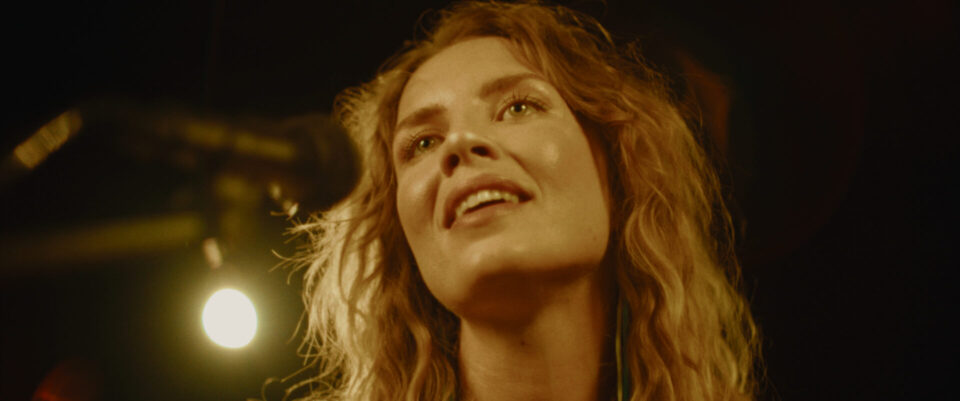
Kristi: I echo Erika in all regards here. The entire genesis of Honey Head began because of a lack of dynamic female characters and a subsequent lack of respect and space at the table for female voices in leadership in our industry. Over the years we’ve learned powerful lessons of discernment around who we invite into the proverbial “Hive.” We were fortunate enough to find 8 incredibly supportive, talented, and passionate men who are feminists in their own right to balance the 20 strong women who rounded out this independent film crew. There’s something safe and empowering about having a 100% female above-the-line team producing this poignant film about women simply existing.
We were never rushed, never dismissed, and were able to curate a protective environment for both the story, ourselves as creative women, and the young female interns and crew members invited to be a part of this production. I’m proud we were all able to grow and learn in an environment where women and men are equal, and happy to witness our handful of male crew members fully commit to bringing this film to life because they believed in the powerful story and the mission and culture of Honey Head. That kind of thing has ripple effects of energy and sets a positive precedent for what’s possible.
What were some of the biggest unexpected challenges you faced making this film that first-time filmmakers should know?
Erika: Financing is always a challenge with indies, especially for first-time filmmakers. We ran into a lot of speed bumps on our journey to greenlighting the project. We even had an investor who we eventually had to part ways with because we found out he had brokered some shady deals in the past. That was a hard decision to make since he was promising to finance the remainder of our outstanding budget. But if it doesn’t feel right, you should always step away. Never make a business decision from a scarcity mindset. The right opportunity will present itself.
From the other side of things, the choice to forego name talent for the sake of authenticity has also presented challenges in distribution. None that we can’t overcome, but it’s going to be a different path for us to prove the film’s worth, since we can’t slap Meryl Streep’s face on a poster and immediately have the golden ticket to every top-tier festival and overseas sales (no shade on Meryl, of course: she’s the queen). Names give you an easy “in,” so we have to figure out a different, more innovative way to get Imogene in front of audiences. For those going this route, prepare to get creative with your DIY distro plan.
Kristi: I still feel that pitching and financing this film (during the pandemic!) was one of the most difficult things I’ve had to navigate in my career. In hindsight, I can see that it was outside influences like pressure to meet a certain budget threshold or navigate expectations around pre-sales and distribution that slowed the process, inhibited our intuition, and created - perhaps - unnecessary roadblocks that could have been avoided. In the end, we decided to do what was best for the film and with that, we created a beautiful, timeless piece of cinema in a tangible way that we’re all very proud of. If that had been the singular original goal, I think we may have saved ourselves some sleepless nights and moments of immense doubt.
All in all, every hoop we jumped through has been a valuable learning experience and afforded us the necessary perspective, knowledge, and skills that we continue to utilize in this next chapter of scaling into the sophomore feature. However, if I had known we’d walk around the moon just to get out the back door to make an award-winning film and that we had it inside of us all along to do so, I would have trusted the process a little more. Realizing early on that making an excellent film isn’t “enough” - but then setting out to do it anyway - and throwing away all expectations of what happens next, that’s the biggest challenge and most valuable lesson I can share.
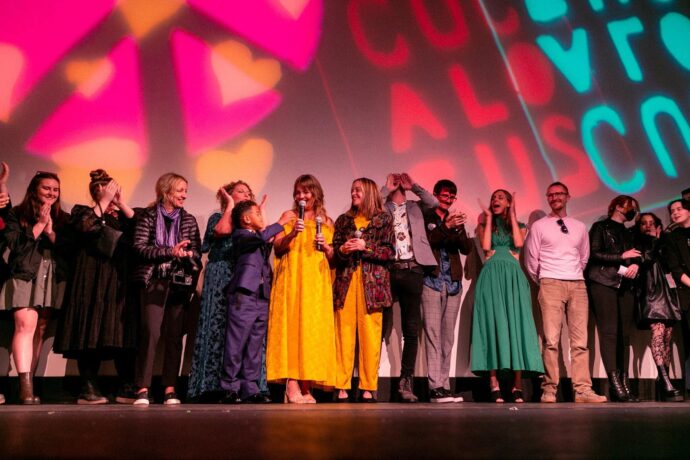
What do you hope to share with audiences about this film, and about where you, this film, and Honey Head Films are going next?
Erika: I truly believe we have made an excellent film with Imogene. It’s now our calling card: the project that we can show potential collaborators and financiers to prove we are capable of making quality cinema. The film has already opened doors for us that we never could have stepped through before. I am excited for the next chapter of Honey Head as not only a film production house but as an independent studio producing original work that continues to grow in scale. The next project in the works is a thriller, so very different from Imogene. It is exciting to have the opportunity to explore stories with more complex elements while remaining true to our mission to put dynamic women at the forefront of our films.
Kristi: In the current climate we’re facing in our industry with strikes and very real threats to the future of original cinema and how it’s consumed; it’s more important than ever to support small, meaningful films. Films without studio pressure to be this-or-that, but emotionally generous stories that evoke curiosity and empathy from their audiences. That’s what A Song For Imogene is, and what you’ll find at the core of every Honey Head film. We’ve always been in the business of breaking down barriers and bucking the system and I encourage viewers to seek out creative work from filmmakers like us who continue to do that. It’s like a commitment to “shop local” as much as possible - it benefits the creative economy and helps to bolster the careers of emerging talent.
But it won’t be as easy or convenient as eating up whatever Netflix is spoon-feeding you this weekend. We’re currently navigating a festival run and distribution for this debut film and as Erika said, it has become a calling card for financing the next project - one that will scale 10x in budget, caliber, and concept. I think that’s every filmmaker’s dream, to have a stepping stone guiding you to the next chapter. We haven’t taken the easy road, but the hope and the silver lining are revealing themselves.
Visit www.honeyheadfilms.com for more as well as http://imogenemovie.com/ for updates on the the film and when you can stream it.
In ‘Napoleon,’ The Conquerer’s Complex Is Both Epic and Hilarious
With its incredible production design and extraordinarily staged battle sequences, Napoleon is as astounding and epic as movies get. At two-and-a-half hours long, you’re certainly going to get your money’s worth seeing director Ridley Scott’s newest film on the biggest screen possible. Its gigantic vision absolutely dominates this intended viewing format, which is fitting for the story of a man whose outsized ego drove him to try to take over the world.
Napoleon and his prideful ego are the main fascination in Ridley Scott’s epic film. The observation that the wannabe conqueror's famous inferiority complex was the motivation behind his brilliant military mind, also coincides with his laughably insecure stature behind castle doors. Embodying the titular character is Academy Award winner Joaquin Phoenix, who gives yet another iconic performance in a film that’s as visually extraordinary as it is comically hilarious.
Telling the sweeping story of Napoleon’s rise and fall, the film opens in revolution-era France, during the harrowing chaos in a town square where revolting citizens stuff the bourgeoisie into guillotines. It’s an unnerving sight for any politically motivated ruler, but not for Napoleon Bonaparte (Joaquin Phoenix), an army general on the rise, who recognizes the potential for a power grab.
Napoleon, we learn, is a revered military general of the French army with a shrewd understanding of strategy and war. In his first big battle, Napoleon leads a small but sizable troop in a surprise attack against an occupying British army; a fight in which he nervously (and comically) hyperventilates throughout, indicating his early lack of self-confidence. Barely prevailing, but still victorious, his win boosts his rank, reputation, and pride.
The film jumps ahead in time, plopping us into various historically important moments throughout (title cards keep the many dates, events, and characters clear for the audience). Perhaps the most pivotal life event is Napoleon meeting the woman who would be his biggest match, Josephine (Vanessa Kirby). Although Napoleon is powerful on the battlefield, Josephine proves to be more powerful in their intimate relationship. The film shows how Napoleon can lead thousands of men into victory in war, but struggles in his subservience to the woman he loves.
https://www.youtube.com/watch?v=1DJYiG6wh0w&ab_channel=SonyPicturesEntertainment
The dominant-subordinate relationship that plays out portrays Napoleon as his most self-effacing and insecure. And it is here that Phoenix and Kirby are phenomenal. Kirby is strong and unwavering, against Phoenix’s insecurities. The film alternates between the battlefield and the bedroom, and the dramatic bedroom scenes are captivating.
But of course, Napoleon must continue to conquer. While all of the battle sequences are incredible, the most astonishing one is set on a snowy ice lake that leads the enemy army to chilling graves. Ridley Scott, the visionary filmmaker behind such iconic films as Gladiator, Blade Runner, and Alien makes this set piece rival Game of Thrones.
Napoleon reached his highest peak after these successful victories, leading to him being anointed the King of France. Of course, this is where things come crashing down. Life back home with Josephine goes south when the struggle to produce an heir arises. And after the change in fortune of wars, Napoleon soon finds himself ostracized by his country, leading to a spiral as he tries to take over the world, alone.
In the title role, Joaquin Phoenix delivers yet again and brings to life what is Napoleon’s tragic flaw: his insecurity. The amount of whining, pouting, and animalistic dialogue from his character had the theater erupting in laughter. Other performances of Phoenix came to mind, such as the helpless naive from The Master to the cackling livewire in Joker.
While it’s a fascinating vision and story to behold, Napoleon begins to lose steam as the film progresses. The story loses its captivation as it tries to shift back through love letters to a now estranged Napoleon and Josephine while marching his hungry army through the snow to their ultimate demise. By its end, we see the true tragedy of Napoleon’s life: that of a man who set out to conquer the unconquerable, while unable to see how ridiculous he looked while trying to do so.
'The Killer' Doesn't Aim Too High, But Hits Its Darkly Comical Mark
Slightly unnervingly (though perhaps not coincidentally), throughout his career acclaimed director David Fincher has most often been compared to the same subject that he’s been most fixated on bringing to the big screen: a serial killer.
Looking at his decades-spanning filmography, this might be an uncomfortably easy comparison to make. Fetishistically-minded projects like 1995’s Se7en, 2007’s Zodiac, and 2017’s Netflix series Mindhunter all spotlight sadistically methodical madmen mutilating their victims.
Moreover, even subject matter aside, Fincher’s reported on-set work ethic is also understood to be nothing short of punishing, infamously requiring hundreds of takes from his actors. And then, of course, his distinctly recognizable visual style–chillingly composed shots striving for aesthetic perfection–also betrays his perverse goal for total control.
All of this leads to his new film, succinctly titled, The Killer. Which is once again, about a cold-blooded murderer. None of which, at this point in his career, is surprising. What is surprising, however, is how damn funny it is.
The Killer follows a contracted hitman (simply billed as “The Killer,” played by Michael Fassbender). Solitarily observing Parisian street life from an abandoned building's floor (an ode to Hitchcockian voyeurism), we not only see him cynically witnessing capitalistic society from up on high but also hearing his thoughts by way of a long-running inner monologue. He's clearly waiting for something–someone–and passes the time doing light yoga, listening to his Smiths-filled iPod (which becomes a hilarious long-running joke), and monitoring his FitBit heart monitor.
https://youtu.be/vs1epO_zLG8?si=fzaGV6bCv1xoIkJY
He's perfectly cool and calculated, up to the point where he has to engage his target. Unexpectedly–and hilariously–the hit does not go according to plan, setting off a series of events that flips his methodically precise world upside-down, and making him the next target.
If you’re waiting for where the aforementioned humor lies in all of this, it’s in all of these misfires. Fincher plays the game of “expectation versus reality” with total gallows-style humor, making for a sadistically funny film that follows. Based on the graphic novel of the same name, The Killer is adapted by Andrew Kevin Walker, who filters the dark events of a hitman on the run through a dry, darkly funny sensibility.
Chaptered by different characters that The Killer must visit in order to flee to safety (as well as ensure the safety of loved ones), the film has fun seeing The Killer's numerous identities, and travels to international locations, all in the pursuit of settling his score.
Michael Fassbender is absolutely perfect in the lead role, bringing a steady, unnerving energy to his character, while also playing the dark humor just right, too. He’s great in the physical part of the role, in which his robotic-like physicality lends itself to a crazy action scene that will definitely impress viewers. Fincher’s methodically funny plant-and-payoffs are exacted hilariously, proving they are a match made in hitman heaven.
The Killer is not David Fincher’s best film. But it also doesn’t feel like it really sets out to be. Perhaps he’s aware of the film’s “B-level” storyline and aware of its simple construction and ambition. Knowing its final viewing place is to be seen in homes (on Netflix), maybe that also brings a more “minor” quality to the film (watching it made me think about current-era Soderbergh films, which have also felt like works churned out for streaming platforms, of late). But to those ends, The Killer is still an edgy, depraved, and hilariously funny movie that will still surprise Fincher's faithful fans.
'Fingernails' Is a Heartfelt Rom-Com With 'Eternal Sunshine' Vibes
There’s no question that today’s advanced technology has made our lives easier to live than ever before. But for all the convenience and certainty it’s brought us, have things also been altered for the worse? Does having the ability to find a life partner based on the results of a dating app fundamentally disrupt one of the most powerful human emotions we can feel: that of love? The new playfully satiric, sci-fi inspired romantic dramedy Fingernails would say, yes.
Fingernails takes place in the near future where couples have the ability to test their love clinically and see if they and their partner are an actual match. As the leading institute’s founder (Luke Wilson) states: “I founded this institute to take the risk out of love. No more uncertainty, no more wondering if you’ve chosen the right partner.” Willing subjects who roll the dice agree to weeks of trials that lead to the final part of the testing process: having your fingernail tested (which is, as the movie states, the first place love can be detected).
Seeing partners find their true love inspires the young and impressionable Anna (Jessie Buckley), so much so that she begins a new job at the institute. Already lucky enough to have successfully matched with her partner (Jeremy Allen White)–which is seen as more of a relief to him than anything else–Anna is quick to learn the job. Enthused with the process, she also enjoys learning from her colleague Amir (Riz Ahmed), an equally kindhearted, compassionate person she is paired with. Together, they conduct weeks' worth of trials for apprehensive couples–including administering blindfolded smell tests of the couple’s various partners’ scents, and having subjects sing French versions of romantic karaoke songs (to elicit the strongest feelings of love), so too do Anna and Amir grow closer. As a result, Anna is forced to question the validity of the very test that proved she was in love with her current partner: could her current emotions show that her heart now lies elsewhere?
https://www.youtube.com/watch?v=mY-by4qPQpE&ab_channel=AppleTV
Fingernails is a very warmhearted, tenderly crafted romantic movie that will really make you evaluate your emotions and place in life. It’s not all sappy, though. Director Christos Nikous, who co-wrote the script with Sam Steiner and Stavros Raptis, playfully mixes in a funnily offbeat world of sci-fi silliness that evokes the vibes of Eternal Sunshine of The Spotless Mind, or even Spike Jonze’s, Her. It has an amusing strangeness to it, but not as strange as his feature film debut, Apples (which fits squarely in the “Greek weird wave” category, that’s most commonly attributed to the films of Yorgos Lanthimos, such as The Lobster, and the upcoming Poor Things). Nikous brings a deadpan coldness to the film, which makes the jokes land even better. Seeing couples watch a marathon of Hugh Grant’s romantic comedies in order to grow their love emotions is quite funny. But ultimately, it feels like such a warm world to experience (credit to cinematographer Marcell Rév, who brings a lush film quality to the look).
In the lead role, Jessie Buckley proves what makes her character so compelling. With her natural warmth and exuberant spirit, she brings a radiance that makes it impossible not to fall for (seeing her sing Yazoo’s “Only You” is melt-worthy). Not to be outdone is Riz Ahmed, who also brings an earnest sincerity that makes their bond feel like a sort of “Jim and Pam” couple you hope to end up together. It says a lot when you suddenly find yourself rooting for Jessie Buckley to intentionally not end up with Jeremy Allen White, who continues to lean into his more jerkish qualities.
Distributed by Apple TV+, Fingernails will be enjoyed most by audiences that are looking for a heartfelt romantic comedy with a bit of sci-fi absurdity. Even if the film is ultimately a little more conventional than it could have been, with a semi-predictable ending, it is a sweet story that will have you investigating your very real feelings. And that’s something you likely won't get with a dating app.
‘Fingernails’ is in theaters and available to stream on Apple TV+ starting this Friday.
'The Delinquents' Will Make You Want To Finally Live Your Life
Delinquent Behavior
A "delinquent" can be either of these things: someone who violates the law, or someone who is overdue in an action. In Rodrigo Moreno's film The Delinquents, the meaning applies to both. In this case, those who break the law in order to rectify something they are crucially overdue in doing: finally living their lives. What starts out as a dryly funny bank heist comedy, The Delinquents ends as a poignant meditation on the sacredness of life that will inspire those who seek out this special film.
Setting the Stakes, Stealing the Cash
The film opens with a hilariously drab shot of a colorless suit laid over a chair. It's the sad uniform of Morán (Daniel Elías), a lifeless bank teller who handles large amounts of money each day for a living, without the faintest trace of joy on his face. One day, Morán nonchalantly enters the main bank vault alone. Staring into the security cameras, he casually proceeds to put over $650,000 in cash into his bag and walks out of the building.
Morán then meets up with an unsuspecting colleague, Román (Esteban Bigliardi), informing him of the illegal act he performed earlier that day. Román also learns of Morán's grand plan: that if he looks after the stolen money while Morán serves out his sentence (which he's calculated to be just over three years; less with good behavior), he'll receive half of the money–which Morán reasons would equal five years' worth of salaries working at their soul-crushing bank job. Initially reluctant, Román agrees, and takes the money to hide. After all, what could possibly go wrong?
https://youtu.be/KacoBtvgcT0?si=51p4ZaUs1QX35fTR
Comical, and Then Poignant
What begins as an impulsive agreement to accept a sizable fortune turns into full-on anxiety for Román–especially after a strong-willed detective enters the picture and signs start to point to his involvement. Román decides it's not worth it, visiting Morán in prison to inform him he can no longer keep the money. Morán–who himself is experiencing the unexpected roughness of prison life–tells him of a hidden nature reserve where the cash can be stashed. Román buries their fortune, but not before meeting a group of friendly strangers at the lake: Norma (Margarita Molfino), Morna (Cecilia Rainero), and Ramón (Javier Zoro) (yes, they are all anagrams, signaling a cosmically fated connection that we all share with one another).
It's here where the first act ends, and where the film takes on an entirely new tone in its second act: one that's less comical, and more observant about life's beauty when you're finally outside of the system. Rámon embarks on a new passionate life path with Norma, avoiding the stresses of his job as well as the family he left behind. The film moves from the busy city into the wide expanse of nature, where Rámon, Norma, and his new friends live (and where Morán may still be connected to this new group of strangers).
A Long Film About the Passing of Time
Rodrigo Moreno's film is an incredible work of art, ultimately revealing how people can let their jobs become their life's meaning and forget the source of true happiness. Moreno's ways of slowing the movie down to reflect this, such as dancing to a long song, hearing a full-length poem read aloud, and simply witnessing beautiful shots of rolling mountains, are flourishes that remind us as viewers to slow down and experience these "unproductive" but beautiful moments without a "productive" value.
The Delinquents is a long movie. At 3 hours and 9 minutes–complete with two chaptered parts–it's something of an odyssey to endure. Ironically, the film (Argentina's official entry to the 2024 Academy Awards) is about the preciousness of passing time, and how we shouldn't waste a single minute of it. To that end, you might think that watching a three-plus hour movie might go against its own message, but I'm here to say that you'd be wrong. The Delinquents accomplishes its mission in the final scene, proving it has the impressive and magnificent power to make you reconsider how you live your life.
'Fair Play' Explores a Risky Relationship After a Promotion
Making its world premiere at this year's Sundance Film Festival earlier this year is Fair Play. A romantic thriller set in the world of high-stakes finance, it stars Phoebe Dynevor and Alden Ehrenreich as a young couple who must navigate their relationship after a work promotion elevates one above the other. Writer-director Chloe Domont's (Suits, Ballers) directorial debut aspires to leave audiences gripped with suspense.
On the surface, Emily (Phoebe Dynevor) and Luke (Alden Ehrenreich) are attractive, successful, lustful, and in love. It's a seemingly perfect relationship, but one that they must hide. That, along with the news of their recent engagement since they work together at an affluent New York investment firm.
Their secret news, however, soon benefits from some good fortune. An opening at the company provides the opportunity for Luke's promotion. The couple grows excited at the possibility, but a twist disrupts their plans. Their boss (Eddie Marsan) tells Emily that it's she who the firm is promoting.
Emily breaks the news to a surprised Luke and even offers to help promote him from her new rank. Luke is initially supportive, but Emily's new position creates a subtle distance between them. This all slowly weighs on Luke's psyche, and the tension between them grows and makes for unstable, dangerous circumstances.
https://www.youtube.com/watch?v=vICUPlr3EEI&ab_channel=Netflix
Writer-director Chloe Domont's brisk and moderately suspenseful feature debut has a lot of winning elements. Its high-stakes finance world setting is feverishly exciting, making for a fast-paced energy and tension that grows as the story gets more dangerous.
The secret romance between Emily and Luke drives the film's propulsive energy. The gender dynamics on display are also powerful and very perceptively shown. In this male-dominated world, Domont writes Emily into a situation that feels exactly like what a bitter man might internalize if they felt overlooked next to a female partner. It's also another fascinating read on gender and power and weak men that is a fascinating part of the film (and, look for the reference to the female-asserting last line of Eyes Wide Shut here, too).
While Emily ascends to power, a once stoic Luke struggles to take this blow to his ego and starts spiraling into the world of internet self-help videos (that also recall the fragile male ego of Don't Worry Darling). Now, without giving away the explosive (and awkwardly staged) ending, Luke does become our true villain, making for a riveting standoff between the two characters.
Ultimately, what holds Fair Play back for me is that the film didn't lean into its genre elements even further. I think that would have been solved if it committed one hundred percent to make Emily the clearly defined main protagonist. Instead, Emily's story is balanced with Luke's perspective, so it's something of a shared couple's story until its climactic ending.
The appeal of Fair Play boils down to the chemistry between Phoebe Dynevor and Alden Ehrenreich. Theirs is one that feels exciting and dangerous. Dynevor is commanding and owns the screen in some very demanding scenes. Ehrenreich delivers an excellent performance, turning from charismatic to embittered and unraveling. Both are captivating at every turn, even when the writing fails to meet them at their level.
1h 53m.
This review was originally published on Jan 24, 2023, as part of our Sundance Film Festival 2023 coverage.
Director Cory Choy Goes For A Total Sensory Experience
Just watch the beginning of his feature film debut, Esme, My Love, and you'll know that there's a special talent behind the camera. Cory Choy–who has an Emmy under his belt for sound mixing–recently made his directorial debut: a supernatural thriller about a mother and her daughter that is as eery as it is profound.
Cinemacy spoke with Cory Choy about all things filmmaking: how he began making movies, developing his first feature as an indie director, working with a nearly all-female crew and cast, and the production issues he faced that nearly ruined the film ("It just goes to show that even when it seems like all is lost, there is sometimes a way forward."). Read on for our full interview.
Where did you grow up, and where do you currently live?
I grew up in Silver Spring, Maryland, right outside of Washington DC. I currently live in Bedford-Stuyvesant, also known as BedStuy, in Brooklyn, New York.
What film made you want to make movies?
I don't think there really was a single film that made me want to make movies. But I can say that a huge influence on me, in general, is my parents. My mother is a playwright and author. My dad was a computer programmer, and they are both musicians. My father plays guitar and my mother plays accordion. Because of them, music and theater were a big part of my life growing up.
As a result, I always had a love for storytelling. Because of my father's programming influence, when I was in middle school, I actually designed my own video games in Macromedia Flash. They were hosted on the site Newgrounds, and I believe you can even find one of them today online (it's called The Chickenator 2000). From there, I developed a love of animation. I think that was one of the big reasons I ended up going to film school; I wanted to pursue animation–I thought.
Some films I loved as a kid in no particular order: Edward Scissorhands, The Phantom Tollbooth, Pink Floyd: The Wall, Dumbo, The Goonies, 'Weird Al' Yankovic: UHF, Léon: The Professional, The Ring, Fight Club, Beetlejuice, and Wayne's World. Video games also had a huge impact on me, particularly the cinematic and iconic Lucas Arts games like the Monkey Island series, Day of the Tentacle, Sam and Max Hit the Road, and Indiana Jones and the Fate of Atlantis.
You are an Emmy Award-winning sound mixer. When did you realize that you wanted to direct?
Although professionally I got my start as a sound person–both on location and in post–I've always been working on my own projects. Oftentimes, small animations songs, or podcasts.
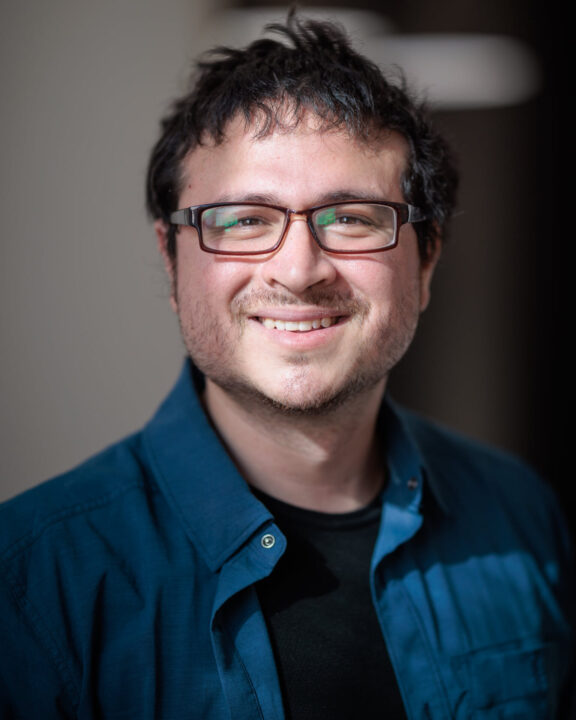
At that time, because I was focused professionally on developing my craft and making a living in sound, I really just found that I didn't have time to work on my own films full-time, and realized that I wouldn't ever unless I made a concerted effort. That probably happened around 2013 or '14 when I realized that my sound studio and business were finally stable enough so that I could finally work on a doc I wanted to make for a long time: a doc about the coffee house musical performances my parents were putting together and running in Maryland for many years.
What steps did you take to develop your earliest projects?
I think I was pretty acutely aware that to make a good film, it was of utmost importance that I had the best possible collaborators. So when I decided to start directing my own projects, the first thing I would do would be to think about finding the best collaborators to work with. People who were both talented and on the same page as me, but who also would be willing to help me out since I didn't have any sort of huge financial backing from anyone.
Having run Silver Sound and worked as a sound mixer and designer for many years on many people's projects, I realized that I had a large network of eager people who I had done many favors for and who would probably be more than willing to return some of those favors when it came to helping me make a feature film.
I didn't want to ask everybody to work for free, though, so I still needed to raise a good amount of money. I was extremely fortunate to find two main investors who put in roughly half of the shooting budget of $90,000 and I raised the rest on my own.
How did you first conceive of your feature film directorial debut, Esme, My Love?
The easiest inciting incident to pinpoint for wanting to make this movie was speaking to a woman about an experience she had with her first daughter that to me sounded terrifying, but to her was one of the most amazing experiences she ever had in her life. I won't go into super extreme detail for privacy reasons, but basically, she had an encounter with an angel, and to her, it was absolutely glorious. However, to folks who heard the story, the circumstances seemed absolutely terrifying. This made me think about how two different people can interpret the same things very differently.
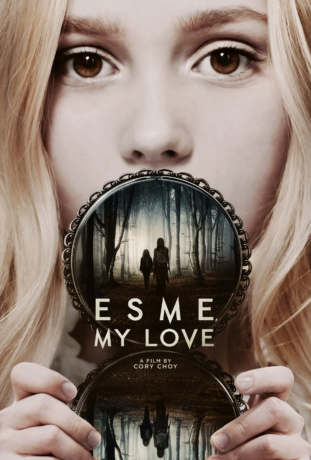
Another thing that I wanted to explore was the mother-daughter relationship. There comes a time in every person's life when they realize that their parents are not infallible. It's usually a pretty important moment, a coming of age.
What made you want to make this story your first feature film?
Part of me wanting to tell this story is from a thought experiment: What would you do if you thought you had to kill the person you loved most in the world to protect them from untold suffering?
Esme, My Love stars Women, was co-written and co-edited by women, with cinematography by a woman, and a score composed by women. Was that intentional, and what dynamic do you think this brought to the film?
This is a story about a woman and a girl, and it was absolutely critical to work with a woman co-writer (Laura Allen). Fletcher Wolfe–my cinematographer–Charlotte Littlehales, and Stephanie Griffin–my composers– brought so much to the film in terms of quality and... vibe? I guess it's kind of the word, but not exactly. All the love and empathy are channeled by Charlotte's voice, while the strings bring tension and fear.
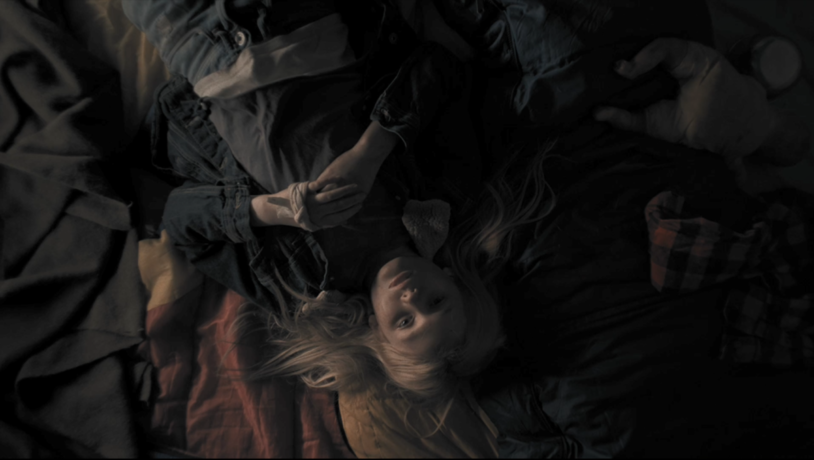
I don't think that my cinematographer necessarily needed to be a woman. It just so happens that Fletcher was absolutely the best person for the job. The music, however, I do think was important for someone who had the experience of being female to write, since so much of the "maternal love" aspect of the film came through the music. One of my editors, Ellie Gravitte, is a woman, and so is my UPM (Crystal Arnette), my production designer (Kyra Boselli), casting director (Catherine Corcoran), and sound mixer (Ash Knowlton). Did these roles need to be fulfilled by women specifically? No. These folks happened to be the best suited for the job. But it makes me proud that so many of them were women.
What was it like working with your two lead actors?
Audrey Grace Marshall is an absolutely unique talent. She was only 9 years old at the time of filming and she might have been eight years old when she auditioned. Even at that age, she was already a very professional presence on set and I would credit that to her acting coach and guardian, her mother Heidi. When working with Audrey, because she was so young, I wasn't just working with her, I was also working pretty closely with Heidi. She didn't like to over-rehearse things, or even really do them that many times so that she was able to keep things fresh and just be in the moment. Moment. Once I was able to embrace that, it became much more fun to work with Audrey and Stacey, who plays her mom.
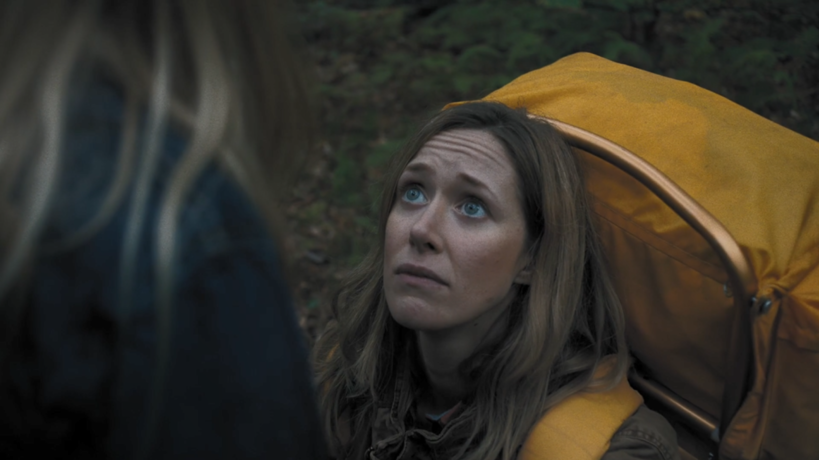
Stacey was a real trooper. The role of Hannah is extremely physical and you have to be willing to get in the mud literally and also emotionally. Also, the practical special effects makeup at one point basically erases Stacey's face, rendering her blind and only able to breathe through narrow slits in real life. When we filmed that day, she had to be guided by the AD by hand to get around. Something like that takes an incredible amount of professionalism and trust.
Among some of the production issues you said you had to overcome was the picture car’s engine dying, as well as the underwater camera casing not working–which you only discovered after you brought everyone to the island for shooting. What were those moments like to endure on the day, and what did it teach you about the importance of resiliency?
One of the things that I learned is that if you can avoid it, you shouldn't try to both direct and produce at the same time. I tried to do both and I ended up extremely stressed out because it's just too much for one person to take on. There were a lot of challenges on set, and I think it would have been a lot easier to deal with had I had someone producing for me, and being able to focus solely on directing. Because I was producing and working on a very limited budget, I had to make sure that most of the crew was released before overtime kicked in.
One day we needed to shoot one of the opening shots, the car driving around a bend down the mountainous road. However, I had run out of time and had to release the crew. My DP stayed on board, generously, and I was going to drive the car because my actresses also had been released by that point. And of course, that is engine decided to kick out. But we persisted, and the light still works. Thank goodness, so I literally got in the car and we rolled it down the hill and I was straining with the non-power steering but we managed to get the shot, and it's very important for the opening of the film.
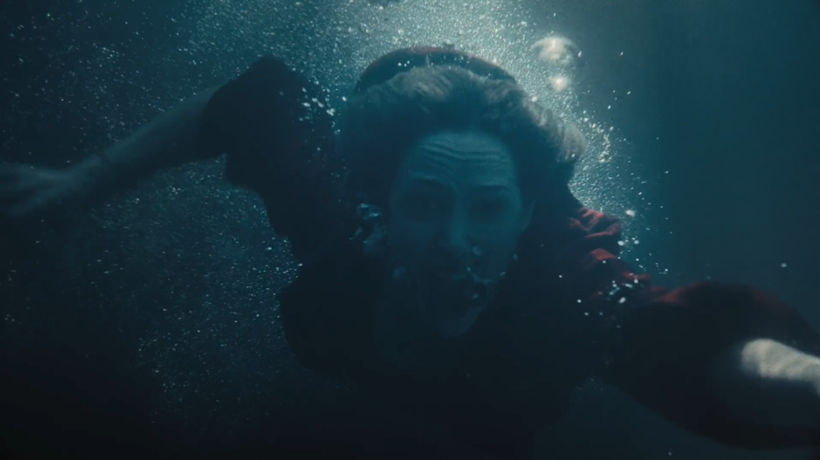
The underwater housing thing was bonkers. There's a water scene that is very pivotal in the film, and the location we had to go to. We could only go to once. It was the last day of shooting, I believe. So we went through a lot getting everything moved on this boat to this small island where a dock was shallow enough to be safe but also deep enough to be convincing. And then of course, after we got all set up, the underwater housing for the A-cam failed; it was leaky. I was devastated. But the first thing we did was shoot as much as we possibly could from the surface without going under because the B-cam was lighter.
We also sent the DP into the water, just very, very careful to get some surface-level shots that way as well. Then, as if to add insult to injury, one of my crew members accidentally drops her phone into the water. I'm like, "Oh my gosh, I'm so sorry," and she goes, "Oh no. No, don't worry. It's one of those new iPhones that's waterproof, so I think it's going to be fine." And I was like, "Wait a second–your phone is waterproof? Give me that phone." And we actually ended up shooting some underwater stuff on the phone. Not a ton of it made it into the actual finished film, but a few split seconds did. Being able to film underwater just brought the morale back to the crew and cast when we were all in a pretty dark spot. It just goes to show that even when it seems like all is lost, there is sometimes a way forward.
What have you learned as a filmmaker, artist, and storyteller after making this film?
I learned so much about everything while making this film. It's pretty hard to quantify, but I think some of the big takeaways are, definitely have a good producer and enough support people. There are many different roles in production and they all have a purpose. If you are eliminating a position, you need to make sure that the folks who are picking up the slack are able to handle it. I learned that sometimes it's more important to take the shot than wait for it to be perfect before you shoot. I also learned that working with more than one editor can be extremely rewarding perspective-wise.
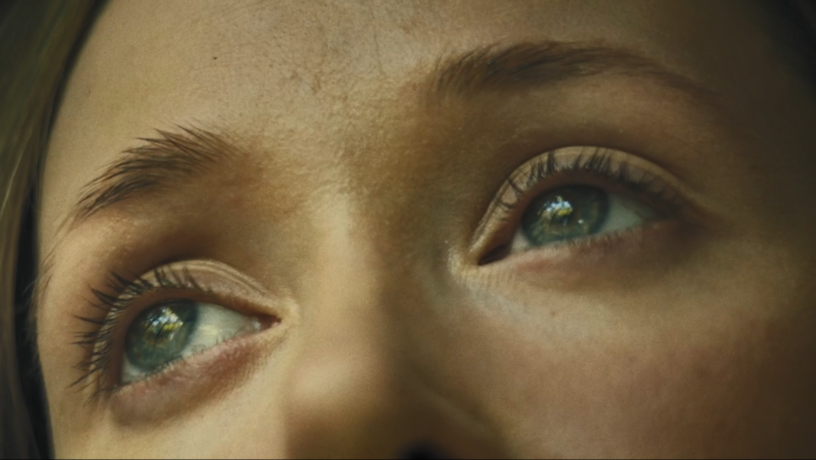
What have you learned about the business of filmmaking that people getting into filmmaking should know?
One of the most important things that I learned is that your movie can basically be sold or taken on a track to be sold before you shoot anything. If you decide to go in on your own, you're going to go through the process of trying to distribute and show people things on their own as well. If you come in with a team, you are going to finish with a team and you're going to be in a much stronger position.
What is one message that you wish audiences would take away after watching Esme, My Love?
I think more than anything else, I want people to watch my movie as a total sensory experience. I want them to feel the sum total of all its parts: the music, the sound, and the visuals all join together to not just set a mood, but also tell integral parts of the story. There are some things in life that are impossible to completely explain with words, and that is one of the reasons why I love filmmaking so much.
Watch this movie at the highest resolution possible, on the biggest screen possible with the best sound system possible, preferably in a place with no outside noise or light; it will make a huge difference.
For more information about Cory Choy, visit his website and IMDb. For more information on 'Esme, My Love,' visit the film's website.

